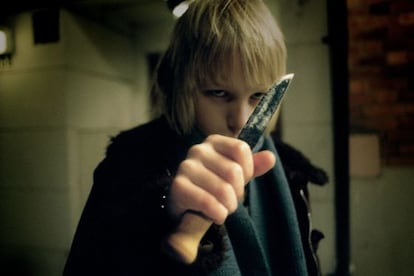Tinker, tailor, soldier, award winner
Directors Tomas Alfredson and Rodrigo Cortés to light up Cinema Jove festival

Tomas Alfredson, the Swedish director of acclaimed vampire movie Let the Right One In (2008) and John Le Carré adaptation Tinker Tailor Soldier Spy (2011), will be among the big names at the Cinema Jove festival in Valencia later this month.
The filmmaker is set to receive the Luna de Valencia Award in honor of his career during the opening gala on June 21. Festival director Rafael Maluenda praised Alfredson as “one of the innovators of genre cinema in recent times who pushes the limits and blurs traditional lines.”
Renowned for his elegant mise en scène, Alfredson has an extensive filmography from before his two most recent movies that is virtually unknown in Spain, and will be screened in its entirety during the festival.
Also taking part in the 28th edition of Cinema Jove, which focuses on the work of young filmmakers, is Spanish filmmaker Rodrigo Cortés. The director of 2010 hit Buried and Red Lights will be taking part in the festival’s Shooting Notes strand, now in its fifth year, where he will be sharing his favorite movies — including Buster Keaton’s Sherlock Jr., Alfred Hitchcock’s The Birds and Orson Welles’ F for Fake — with the public.
Alfredson’s extensive filmography is virtually unknown in Spain
Passing through, too, will be 25-year-old Blancanieves star Macarena García and Pagafantas actor Gorka Otxoa. The two Spaniards are both receiving this year’s Un Futuro de Cine Award, which aims to spur on bright young stars just starting out in film. Former recipients of the prize have included Carlos Areces, Leticia Dolera, José Mota, Marta Etura and Michelle Jenner.
This year’s official section includes the Spanish premiere of the first feature to be directed by a Saudi Arabian woman. Haifaa Al-Mansour’s Wadjda, which screens on opening night, tells the story of a little girl who longs to own the green bicycle she passes on her way to school every morning. Her dream brings her into conflict with her mother, who worries that bikes represent a danger to feminine dignity. The movie is less of an “angry reaction” and more of a “presentation of the facts,” directed with a tenderness that points to hope of change, says Maluenda.
Al-Mansour will be in Valencia to talk about the situation in her homeland as well as the process of making of the film, which was coproduced with Germany.
Hope is the element that unites all 10 films in the official section, which are imbued with a hint of pessimism, and in the most part star children or young people forced to grow up before their time because of the troubles they face.
These include economic and social issues, such as those that feature in Greek film The Daughter and My Dog Killer from Slovakia and the Czech Republic; problems relating to identity, as in Into the Dark, from Norway, and Dutch movie The Deflowering of Eva van End; and childhood and family troubles in Matei Child Miner (Romania, Germany, France) and La Paz from Argentina.
There will also be reflections on the subject of harassment in both the workplace and in relationships in the form of Romanian movie Living and Circles, a story based on real events that goes over the unhealed wounds of the war in Bosnia.
All 10 official section movies are works by nonconformist filmmakers who are looking for their own means of expression and have yet to receive major attention — the features by which Cinema Jove has strived to differentiate itself over the last 10 years in order to find a niche among the wide array of Spanish festivals.
Tu suscripción se está usando en otro dispositivo
¿Quieres añadir otro usuario a tu suscripción?
Si continúas leyendo en este dispositivo, no se podrá leer en el otro.
FlechaTu suscripción se está usando en otro dispositivo y solo puedes acceder a EL PAÍS desde un dispositivo a la vez.
Si quieres compartir tu cuenta, cambia tu suscripción a la modalidad Premium, así podrás añadir otro usuario. Cada uno accederá con su propia cuenta de email, lo que os permitirá personalizar vuestra experiencia en EL PAÍS.
¿Tienes una suscripción de empresa? Accede aquí para contratar más cuentas.
En el caso de no saber quién está usando tu cuenta, te recomendamos cambiar tu contraseña aquí.
Si decides continuar compartiendo tu cuenta, este mensaje se mostrará en tu dispositivo y en el de la otra persona que está usando tu cuenta de forma indefinida, afectando a tu experiencia de lectura. Puedes consultar aquí los términos y condiciones de la suscripción digital.








































